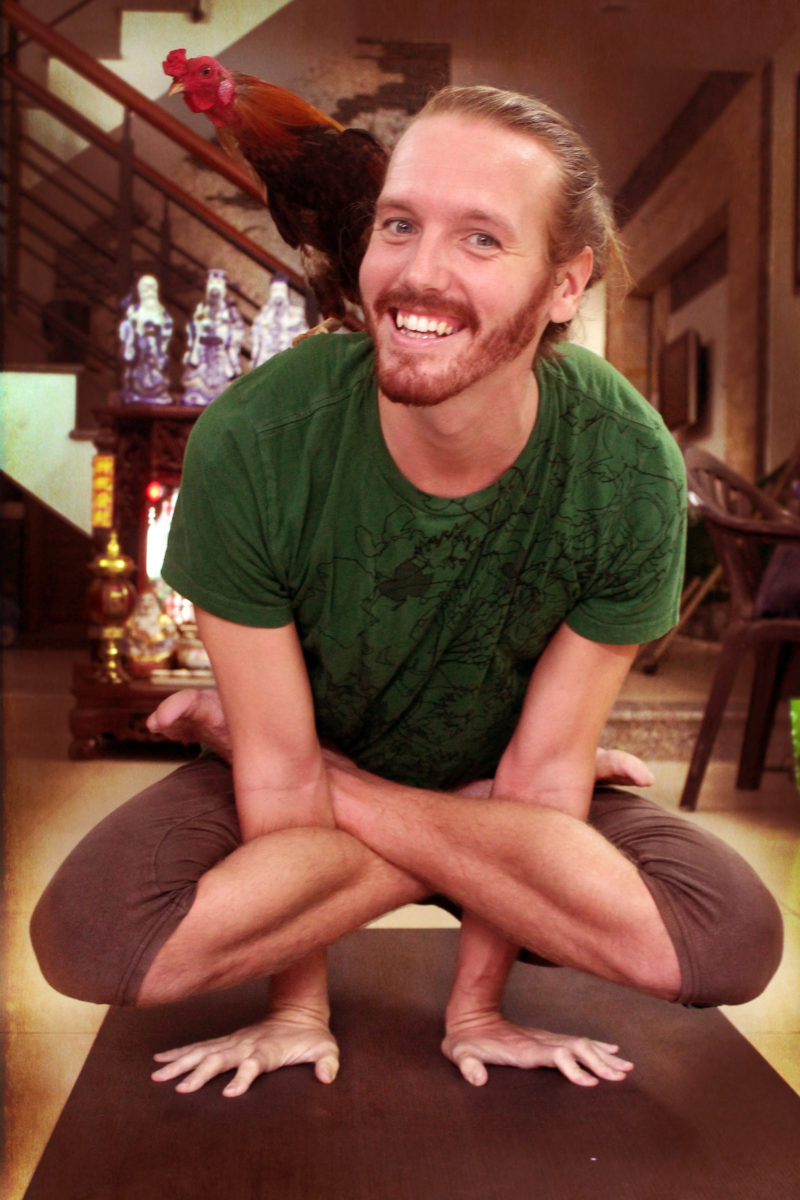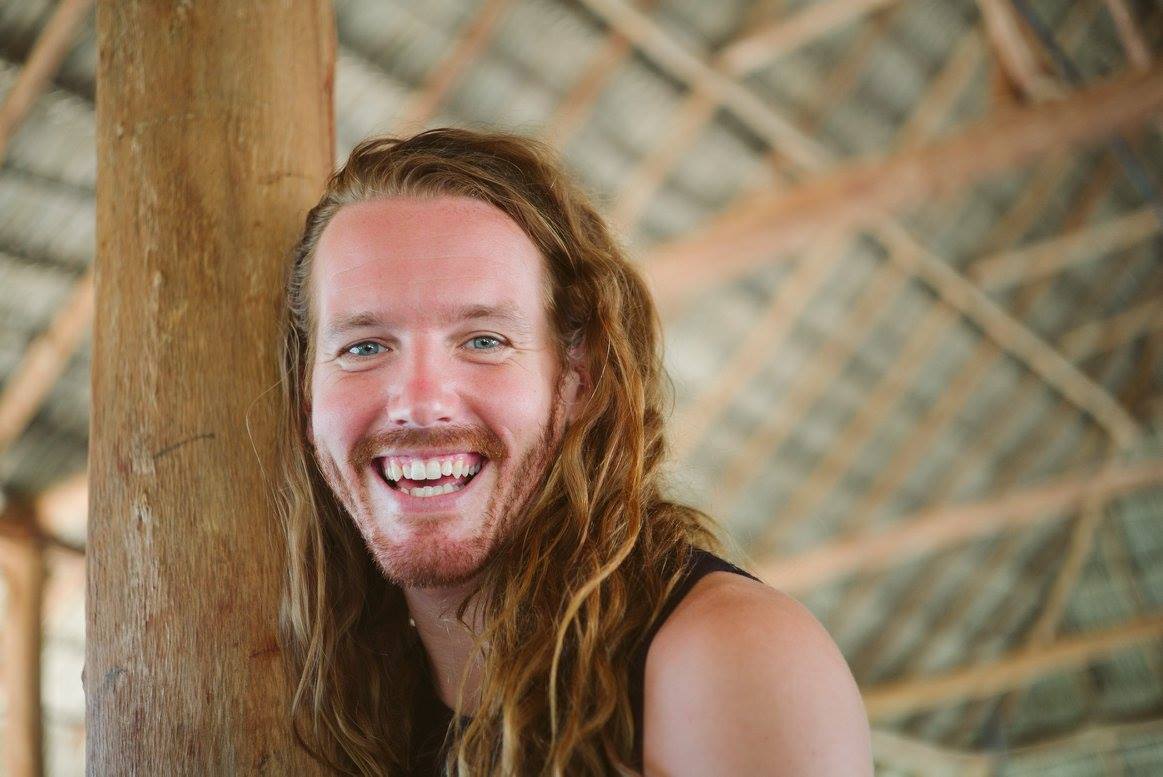
Sitting in the Cinnamon Café in downtown Fredericton eating a vegan falafel wrap, Robert McKenna certainly looks the part of the transient yogi, with long red hair occasionally wrapped up in a man-bun and an equally vibrant beard.
McKenna has been a teacher with the Moksha Yoga chain for six years. He travels to Moksha studios all over Canada, holding workshops and teaching classes.
He was at the Fredericton Moksha studio from the beginning of March until March 21, and is now at the Charlottetown, P.E.I. studio. Originally from Cambridge, Ontario, he said he is happy to be teaching more within Canada, because it allows him to see his family more than once a year.
“Of course I miss my birth family, but at the same time too what’s nice about travelling around these Moksha communities [is I have] a family in every Moksha studio I’ve ever been in because they’re so tight knit,” McKenna said.
If you look him up on Facebook his name is Robiwan McKennobi. He said after travelling to India he had grown a long bread that his two nephews thought made him look like Obi Wan Kennobi. They suggested he change his name to Robiwan, which McKenna then put on his Facebook profile as a joke. He soon forgot about it, and was surprised when he went to his first Moksha teacher training two years later and his fellow trainees, who he networked with on social media beforehand, were referring to him as Robiwan.
The name stuck, which he said he doesn’t mind – until they wrote it on his cheques.
“I’m like, ‘I can’t cash this,’ and they’re like, ‘wait, that’s not your real name?’”
Social media disconnect
McKenna started doing yoga eight years ago after tearing out his shoulder blade in a skydiving incident. His injured shoulder was hunched up to his neck, he couldn’t sleep and was in pain every day.
After a month of doing yoga his shoulder had dropped back to normal and he was sleeping at night. McKenna said it allowed him to improve his life by creating an awareness of the narratives we build to explain our unhappiness.
“Just by doing yoga more and more I was able to take stock in my life, see where things were kind of falling apart; things that weren’t making me happy, remove those things, and just have the things that were making my life feel full,” he said.
This cultivation of awareness through yoga is something McKenna believes the world needs.
At a time when everyone is constantly plugged in, McKenna said even when we say we’re doing nothing, we’re always doing something. Whether it is sending a Snapchat, scrolling through Twitter, or watching a video on YouTube, we create distractions so we never have to spend time alone with ourselves.
McKenna said the truth is modern humans need the buffer space yoga creates that allows us to set the distractions aside.
“The cool thing is, when you go into a yoga practice, even though you might be with 30 other sweaty people around you, you are spending time with yourself because you are feeling your breath, you’re feeling your body… that’s why I think it’s just, this is such a perfect time for yoga right now, the world we live in.”
Ironically, the advanced technology that can stress us out and make us need a practice like yoga or meditation has actually helped contribute to yoga’s popularity.
The pictures of yoga on social media that trend the most are usually of young, thin, flexible white women in bikinis doing advanced poses in tropical locations. There is nothing wrong with that, McKenna says, but when people who don’t look like that see those images, it can lead them to think yoga isn’t for them.
“This subconscious message is being portrayed that yoga is for young white women, and yoga is about being bendy, when the truth is that’s not the case at all,” he said.
“That’s like saying dinner is only for people who are full, but eating is for people who are hungry, and everybody’s hungry for yoga.”
McKenna himself is active on social media, but says he never posts any photos of himself doing yoga. The only exceptions are joke pictures he posts of himself doing yoga poses named after animals with the animals he sees.
“There’s a picture of me doing Rooster with a rooster on my head,” he said.
While he admits he is starting to see posts representing normal people doing yoga, he said “they definitely don’t get the same type of likes.”
“A middle-aged dad doing tree pose it’s not going to have two million likes, it’s not going to happen. We both know that,” he laughs.
Bee at one…
Although McKenna takes his practices seriously, outside the studio, he said he’s more of a joker.
His loud laughter could be heard from behind the Fredericton Moksha front desk while he was getting ready to teach a class.
This doesn’t mean he shies away from humour in class, as long as it’s warranted.
“You know, you fall on your face, or you fart in class, it’s a great time to laugh, and realize, ‘oh shit, this isn’t so serious.’”
He brought up one of the craziest things that’s ever gone down while teaching a yoga class. It was a long story that ended with McKenna brushing thousands of sleepy bees off peoples’ backs while they were doing downward dog – the studio had been closed several days after while a hive was removed.
The 32-year-old Yogiwan-Kenobi seems to be living the yoga lifestyle to its fullest, spreading the love and kicking your butt in class at the same time.
He said he tends to be the sort of person who invests 100 per cent into a hobby, but quickly burns it out.
When he took up yoga he wondered if the same would happen. After eight years, he doesn’t think it will.
“You could study this every single day for eight hours a day for the rest of your life, and on your deathbed you could still feel like you’ve only scratched the surface.”

